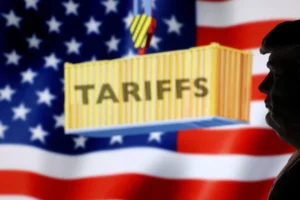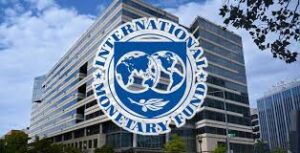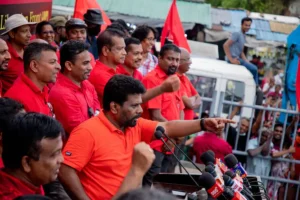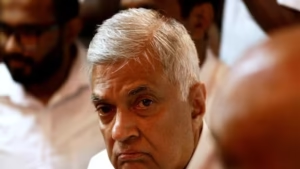
Govt’s grip tightens at the grassroots, the real test lies in steering through a looming economic storm.
- CNL Reporter
- June 3, 2025
- Weekly Political Review
- economic storm
- 0 Comments
Weekly Political Review
Wide Angle Focus on NPP Govt Power Without Progress?
President Anura Kumara Dissanayake (AKD) appears increasingly confident in the National People’s Power (NPP)-led Janatha Vimukthi Peramuna’s (JVP) strength to command a majority across numerous Local Government (LG) bodies.
Yet, as Sri Lanka heads into the next phase of post-election governance, the fanfare is tempered by logistical delays, economic pressures, and internal political turbulence.
Despite the optimistic tone from the NPP camp, reality paints a more complicated picture. With no party securing a clear majority in over 170 LG bodies, forming functioning administrations is proving a time-consuming process.
While the inaugural sessions are scheduled to begin tomorrow (2 June), councils are granted a seven-day window to convene. That period may be further extended, according to the Ministry of Provincial Councils and Local Government.
Commissioner General of Elections Saman Sri Ratnayake confirmed that 161 LG bodies with majority outcomes have already been gazetted and are ready to meet.
However, for the remaining 177 councils without outright winners, appointments and structures are still being sorted out, potentially pushing back timelines even further. Ratnayake also indicated that several party and independent group nominee lists were still incomplete as of the 30 May deadline.
But even as the NPP celebrates its local gains, a harsher reality looms: the economic crisis remains unresolved. The shift from crisis to recovery is proving stubbornly slow, and AKD’s administration has yet to deliver tangible improvements.
Economic Truths Hit Home

Central Bank Assistant Governor Dr. Chandranath Amarasekara delivered a sobering assessment last week, noting it would take two to three more years for Sri Lanka’s economy to return to pre-crisis 2018 levels. The cost of living, he noted, has doubled since 2021.
Data supports this grim outlook. In May, Colombo’s Consumer Price Index rose 0.8% to 192.8 points, with food inflation jumping 2.7% — nearing levels last seen during the height of the 2022 monetary crisis. Inflation over the past 31 months stands at a staggering 3%.
On top of these pressures are external uncertainties — from complications with the IMF programme to the growing uncertainty around U.S. trade tariffs that could further strain Sri Lanka’s fragile export economy.
Tariff Tensions Return

Relief was short-lived after a U.S. court temporarily blocked the Trump-era tariffs. Within 24 hours, an appellate court stayed that ruling, bringing the threat of retaliatory levies back into focus. These tariffs, particularly on key Sri Lankan exports, have the potential to destabilize the fragile recovery.
A Sri Lankan delegation led by Deputy Finance Minister Harshana Suriyapperuma held a second round of talks with the U.S. Trade Representative last week. Central Bank Governor Dr. Nandalal Weerasinghe, Economic Advisor Duminda Hulangamuwa, and Ambassador Mahinda Samarasinghe were also present. Speedy resolution is critical to avoid worsening economic headwinds.
IMF Demands and Delays

The IMF remains a tough gatekeeper. Spokesperson Julie Kozack stated that the timing of Sri Lanka’s next funding tranche depends on delivering key reforms — most urgently, implementing cost-reflective electricity tariffs and an automatic pricing mechanism. These conditions, alongside progress on the Financing Assurances Review, are prerequisites for moving forward.
With domestic opposition to utility price hikes running high, the Government finds itself walking a political tightrope.
Diplomatic Overtures
While economic reforms stall, Sri Lanka is making visible diplomatic moves. Visits by high-profile foreign dignitaries — including New Zealand’s Deputy PM Winston Peters, China’s Commerce Minister Wang Wentao, and Poland’s Foreign Minister Radosław Sikorski — suggest a desire to deepen foreign ties.
China, in particular, expressed renewed investor interest, with Wang praising Sri Lanka’s apparent political stability under AKD’s leadership. He pledged continued support, signaling hope of increased Chinese investment inflows.
But optimism alone won’t pay the bills. Translating goodwill into hard economic outcomes remains the administration’s real challenge.
Cabinet Chatter and Party Rifts

Amid all this, political noise is growing louder. Senior JVP/NPP Minister Bimal Rathnayake has confirmed that changes are imminent within government ranks, including possibly his own portfolio. Speaking candidly in a televised interview, Rathnayake noted that many chairpersons were appointed temporarily and that a reshuffle is necessary for smoother governance over the next four-and-a-half years.
However, Rathnayake’s statements triggered contradictions from fellow ministers. K.D. Lalkantha flatly denied any Cabinet reshuffle, going so far as to mock proponents of the idea. Meanwhile, Sunil Handunnetti insisted there was no need for structural changes, claiming all ministers were fulfilling their responsibilities.
The conflicting messages highlight growing friction between the JVP and its NPP partners — a coalition once celebrated for its ideological discipline. Now, it appears public confusion may be a deliberate tactic to mask internal disagreements.
MPs Bow Out

Three NPP MPs are reportedly preparing to resign, citing personal and financial reasons. The JVP/NPP’s policy of voluntary, unpaid public service has placed financial burdens on members previously employed in the public and private sectors. The party is said to be accommodating and has already prepared to fill the vacancies swiftly.
Wickremesinghe Steps In
In a curious development, former President Ranil Wickremesinghe recently appeared as Chief Guest at the Bay of Bengal Maritime Dialogue after Prime Minister Harini Amarasuriya declined the invitation. The optics of a former leader stepping in for the current PM fuelled further speculation about a reshuffle at the top — especially amid rumblings that Amarasuriya could be replaced despite her key role in attracting the urban middle class and professional support to the NPP.
While officially denied, the whispers haven’t stopped.
LG Confusion Continues
Even as LG bodies prepare to convene this week, confusion reigns. The Election Commission has warned that only gazetted members can attend the first sessions. Without finalized nominee lists, many councillors risk being shut out.
The sessions will be chaired by assistant commissioners, but whether effective administrations can be installed without further delay remains in question.
Conclusion: Power Is Not Enough
The NPP’s local-level gains give the illusion of political dominance — Executive, Legislative, and Local. But with economic challenges mounting, internal cohesion weakening, and public patience thinning, mere power is not enough. President AKD’s real test begins now: Can he stabilize the economy, deliver reforms, and preserve unity in his ranks?
If not, the very support base that catapulted him to power may be the first to turn.


